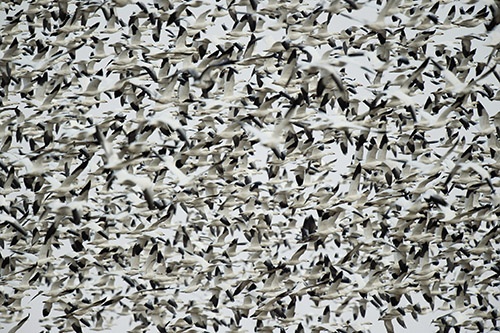 Ray Hennessy/Unsplash
Ray Hennessy/Unsplash
Strange Dolls
Translation by Katia Grubisic.
I dreamed that grand-maman was a giant. Rose was enormous: she could crush houses with her toes. She laughed a squeaky, high-pitched laugh. Actually, she might have been an ogre, because I think she was trying to eat Lily and me. She wanted to swallow us whole. She wanted us all to herself. I’m not sure. We were trying to escape into a forest, maybe. Part circus, part fairy tale. The dream was somewhere between a burlesque show and the story of Tom Thumb.
Grand-maman hugged us tight, smothering us with her giant arms.
When I got to work in the morning, I was exhausted. I headed downstairs, into the theatre. Three puppets on hangers dangled limply from their strings, their heads slack and low, eyes downcast. They were waiting their turns, ready to perk up the next time they had to go onstage. I remember every detail so clearly: the right angle of the chairs staring back at me, the beam of light at the hem of the heavy black curtain, the slightly dusty smell of the puppets, which had been hanging there for a long time. One had thick, black wool hair, another had little beady eyes that rolled in every direction. I had sewn them myself. The last one’s arms drooped at its sides. It didn’t look like there was enough cotton wool inside their bodies for them to stand upright. My dream haunted me. I wasn’t sure if I was imagining them, these strange dolls, or whether I’d really made them.
Secretly, I wanted Lily to come to Montreal. I missed her. I resented that she got to be in Lavillette. Or rather, I would have liked to be with her, and with Mai too. But my sister must have known all that: Lily and I had never needed words to understand each other. The two of us have always had other languages. Twins. Grand-maman’s like that too: she speaks silence and thinks others understand the words tucked inside.
Grand-maman is like a twin.
After work, I stopped by an old snack shack not far from my house. It’s a bit of a dive, a spot Lily and I go to when she’s here. At the counter, as I was getting my cheeseburger, I noticed a row of photos on the wall above the till. Six pictures of the same person, a tall, thin Asian man—the owner, or else his grandfather—wearing military fatigues. With his wife; with a rifle; holding a hand grenade. The second-to-last photo was of him in the middle of a field, holding a snow goose by its feet. He was still wearing combat gear, but he had a black Lab with him. It was the only picture of him smiling, a thin smile. His face was so happy his eyes were almost closed.
I couldn’t stop looking at the photos. I don’t know whether it was the images themselves that unsettled me, with their odd depth of field, as if someone had taken pictures of a dream; or the fact that dead animals and war seemed to be following me everywhere. When I got home, I took out my camera and promised myself that I would photograph birds, too.
I slept fitfully and dreamed all night again. I was a snow goose. I traced the Mississippi River down to Louisiana, gliding gently across the sky, soaring over towns and rivers. I remember the wind in my feathers, the wind skimming my beak, the feeling of floating above the Earth. I could see the horizon, its thin, endless line. On the other side, a calm, translucent ocean merged with the sky. As if it were a single dimension, one big swath of blue.
It reminded me of grand-maman.
Grand-maman, who would describe to us in minute detail the geese invading the field by the little house.
It only occurs to me now, but grand-maman must be right: they’re not coming back. The flock must be lost.
There were never any at all in Lavillette. ⁂
Translated from Les filles de l’Allemand, 2016, published by Marchand de feuilles. Reprinted with permission from the publisher.
Annie-Claude Thériault is a Montreal-based writer, born in Ottawa to Acadian parents. She has published poetry, short fiction and three novels; the second, Les filles de l’Allemand, excerpted here, won the Antonine-Maillet-Acadie Vie literary prize in 2017.





